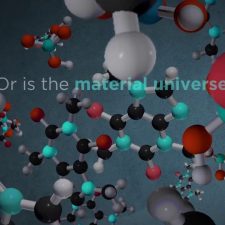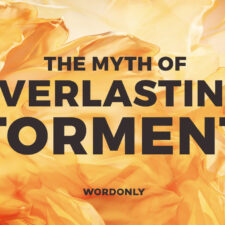In his November 2016 video, “Is HELL REAL or an Invention of the Church?” former Christian pastor and missionary, Joshua Tongol, sounds off on his problems with the doctrine of hell and eternal damnation. He opens with the example of a loved one who doesn’t believe Christianity but still has a loving heart. They die suddenly. “Where are they now?” he asks. Fundamentalists would say, “Hell. Forever. Eternal conscious torment.”
Of course, most Christians trying to be soft in their response would say, “Well, that’s for God to judge.” Theologically speaking, however, most Christian fundamentalists still silently feel—without the salvation prayer (an invention within the past 100 years)—the unregenerate “unsaved” will be going to hell. Even if one says the prayer, without true repentance and a heart-felt desire to pursue Christ, can’t they still be counted as “still-born”?
Tongol poses some tough questions. I was completely unequipped to answer the same questions in my late teens when a Jehovah’s Witness friend fired them at me. My inability to answer these questions in the face of my staunch Catholic upbringing marks my own launch into personal apostasy. That fall would last over two decades before I returned to the faith. The questions:
- What kind of loving parent would send their children to eternal damnation? For not believing? For having little context for believing?
- How to reconcile God’s unconditional love and everlasting mercy with eternal damnation? Preachers push this concept often when they posit “God loves you so much, but if you don’t love Him back, you’re going to burn.”
- If God is omnipresent, how can the common explanation that hell is “existence without God’s presence” hold any water?
My Children Are Destroyed By Lack of Knowledge
When you can’t reckon the gap with logic, folks rebut with, “What does the Bible say?” Well, which Bible? Certain bibles don’t mention the word “hell” at all. Furthermore, the images of hell don’t seem to coincide. Are we talking about the verses that support an eternal hell, the verses that support the destruction of sinners, or the verses that support a temporary hell? So, which is it?
If God is all-knowing, as the Bible affirms, why create people who are simply destined for eternal hell? As a parent, say you’re able to clearly see the future for your children. You see that your next child will have less than 100 years to live on the planet, and then will burn in eternal conscious torment afterwards. Would you still bring them into existence? Our lowly, natural minds would say certainly not. If we can agree that God is way more just, way more loving and way more merciful than we are, it’s safe to assume we don’t have the whole picture.
Does it seem fair to be eternally punished for believing the wrong thing about God? Maybe you’re born in the wrong place, at the wrong time or into the wrong religion. A common response to the remote aborigine who never hears the Gospel is, “Well, God will take that into account then.” Essentially, they’ll be graded on a curve because of their ignorance. So then are missionaries doing a disservice to proclaim the Gospel to indigenous people, placing them in the path of eternal damnation by risking their rejection of Jesus? Why make them responsible and put them at risk? Wouldn’t ignorance over a span of less than 100 years and a higher likelihood of union with the Father be better than risking them making a bad decision and landing in eternal torment? This same argument has been applied to abortion providers, as if abortion simply jettisons the unborn into the lap of God.
Will we really be infinitely punished for finite sin and understanding? This possibility is hard for our fallen minds to swallow. Yet, if we believe the Bible, we can expect God is fair. Not only is He friend and father, but also judge.
And so, the questions continue to brew.
What’s the Big Idea?
Tongol asks, “Does God’s loving pursuit of humanity end at death?” If love is patient, does one’s physical death mark the end of that patience? What of the many who live short lives?
The common retort is, “God gave us all free will. God doesn’t send His people there; we send ourselves.” And if that is true, and it was our free will that landed us in hell, can we not use our free will to get back out of hell? Does our free will stop at physical death? Isn’t the concept of hell dangerously abstract to those with no experience of it?
If the residents of hell (angelic and human) have–through their own free will–resisted the love of God, can God’s love be resisted forever? Wouldn’t even a loving earthly parent try to snatch their child out of eternal torment? If God is love (as Christians claim) why would God do anything less for His children?
The scenario can be irreverently described like this:
Humanity starts with two people who trip over themselves in the garden of Eden and commit all subsequent generations (billions and billions of people) to sin-driven lives, losing most of the Father’s creation to hell. God, being smart and loving, has a plan. He sends His Son to die on the cross to take our sin from us and model the Way, the Truth and the Life, BUT still only a few people will find salvation. “Narrow is the path, but wide is the road to destruction.” (Matthew 7:13)
So, what would be the point to losing most of your creation to the devil; to free will; to sin?
If eternal hell does exist, shouldn’t Christians be more passionate about witnessing to the world? How can we even sleep with millions of people dying everyday with little or no knowledge of the Gospel? Do we not care? Do we not believe in hell? Are we just lazy?
In the Nazi holocaust of World War II, millions of people were tortured and killed. Fair to say most of those were not evangelical Christians. The unsavory question: Should we believe that most of those people are in hell along with their persecutors because they didn’t believe and convert during their time on earth?
Many fundamentalist Protestants may even say Mother Theresa herself has been swept into to hell. As a Catholic, the Protestants may argue she would have been works-based and not operating under grace. But if we believe our eternal salvation hinges upon accepting Christ or saying a salvation prayer before our physical death, isn’t that works? Both contingencies are actually marketed by churches as steps we have to take in order to become “saved.” Does your chance to accept Christ as Lord and Savior end upon physical death?
Retribution, Restoration or Both?
Tongol goes on to ask, “Is true justice retributive or restorative? Is it all about getting what you deserve or is it about restoring a person?” If unending punishment is the solution, then evil is not overcome by love, not overcome by good. In fact, it would appear evil would have won. An eternal hell keeps the cycle of evil and penance going forever. It keeps the cycle of evil demons doing evil things to evil people going forever. If that is the case, there is nothing redemptive in that. Was Jesus’ example to us an example of retributive or restorative love? (Hint: John 3:17 NKJV, “For God did not send His Son into the world to condemn the world, but that the world through Him might be saved.”)
When our Lord stood down the crowd wanting to stone the woman for fornication, most of us agree He disqualified them from casting the first stone. Maybe fewer of us notice that—in doing so—He qualified Himself at the same time. He did not cast stones but simply told her to go and sin no more. (John 8:11)
Do we not know the will of the Father through the life of the Son?
Here is where the opposing comments arise:
- “It doesn’t matter how you feel on this topic.”
- “It doesn’t have to make sense.”
- “While you may not be willing to send people to hell forever, you’re not God.”
“So even people you love may be burning in hell forever,” Tongol says.
Love heals. Love restores. We know the will of the Father through the restorative life of the Son. Did Jesus not teach we are to forgive our neighbor not seven times but seventy-times-seven? Will not a loving, infinite God do even more for us?
Is It Wrong to Even Ask the Question?
Rejecting the notion he is a Christian Universalist (who says everyone is going to heaven,) Tongol makes the point: Once he lands in the afterlife, he “would rather be guilty of overestimating the love of the Universe rather than underestimating it.”
The “Universe”? An apparent nod to pantheism and the notion that the Creator and the creation are all one. While Tongol’s questions are well-constructed, he—like the rest of us—has room to grow in the understanding of God’s character. The Potter is not the clay.
I believe there was way more accomplished through Christ’s atonement than we can intellectually grasp. I believe Jesus taught on hell and that it certainly exists, but my jury is still out on how many will be lost to the grave and how many will be lost to eternal conscious torment or everlasting destruction. (2 Peter 2:9 says, “The Lord knows how to rescue the godly from trials, and to keep the unrighteous under punishment until the day of judgment…”)
Of course, maybe that’s the problem with the whole question. I’m placing questions about salvation into my own court instead of keeping them in God’s. We’re counseled by God’s response to Job and by verses like:
- Does not the potter have power over the clay, from the same lump to make one vessel for honor and another for dishonor? (Romans 9:21 NKJV,)
- And the vessel that he made of clay was marred in the hand of the potter; so he made it again into another vessel, as it seemed good to the potter to make. Then the word of the Lord came to me, saying: “O house of Israel, can I not do with you as this potter?” says the Lord. “Look, as the clay is in the potter’s hand, so are you in My hand, O house of Israel! (Jeremiah 18:4-6) and
- Surely you have things turned around! Shall the potter be esteemed as the clay; For shall the thing made say of him who made it, “He did not make me”? Or shall the thing formed say of him who formed it, “He has no understanding”? (Isaiah 29:16.)
Is it darkened and audacious to even ask questions then? Yes, we are to seek His face and grow in our understanding of His character, but far be it from us to push an “ought” or “should” onto the Father. It is surely a darkened mind that seeks to pass judgment over the methods and intentions of our infinite Father.
Questions Bought by Eternal Conscious Torment
To summarize some of the questions provoked by the doctrine of eternal conscious torment:
- Are your deceased loved ones exposed to eternal conscious torment for not saying a salvation prayer?
- What kind of loving parent would send their children to eternal damnation? For not believing? For having little context for believing (e.g. born at the wrong time, in the wrong place or into the wrong religion?)
- Will we really be infinitely punished for finite sin and understanding?
- How can we reconcile God’s unconditional love and everlasting mercy with eternal conscious torment?
- If God is omnipresent, how can the common explanation that hell is “existence without God’s presence” hold any water?
- Will our loving God sustain spiritual torture for all eternity? The Bible says all are sustained through God. We cannot exist apart from Him.
- Are the punished granted eternal life as well as the redeemed? According to the doctrine of conscious eternal punishment, they are.
- If God is all-knowing, why create people who are destined for eternal hell?
- Does God stop pursuing us upon physical death? Does your chance to accept Jesus as Lord and Savior end upon physical death?
- Does judgment and subsequent delivery to heaven or hell occur immediately upon physical death? If so, how do we rectify the resurrection and judgment during the Second Coming? (Matthew 25:31-46)
- If eternal hell does exist, shouldn’t Christians be way more committed to saving the lost than they are?
The doctrine of eternal conscious torment—a stumbling block that brings emotional distance and confusion to believers and unbelievers alike—seems to be far out of character with the Father of unconditional love and unending mercy. Jesus even went to His death without chastising His accusers. “You will be with Me in Paradise,” He told the believing thief.
In our confusion over this issue, are we as wrongly accusing God as the Jews did Jesus?
If I’ve established anything on the doctrine of hell, it is to continue to seek understanding and intimacy, but to do so with a heart hungry for communion—not with a heart rife with intellectual judgment or emotional confusion surrounding my prospects for the afterlife.

References
Amirault, Gary. Tentmaker. Bible Translations That Do Not Teach Eternal Torment. Retrieved from http://www.tentmaker.org/books/GatesOfHell.html.
Jones, Erik. Life Hope & Truth. What Is Hell? Retrieved from https://lifehopeandtruth.com/life/life-after-death/what-is-hell/.
Tongol, Joshua. YouTube. Is HELL REAL or an Invention of the Church? – Joshua Tongol (Former Pastor/Missionary). Retrieved from https://youtu.be/54KoNT-19Bk.














Is there a Part 2 – the fairness of hell?
Norman,
Thank you for writing! No, I never proceeded into developing the part 2, though I still may in the future.
Essentially, I hung at both conditionalism and traditionalism being both potentially valid Biblical arguments. Universalism is obviously not sound, but I think–if one is intellectually honest–there is solid Biblical support for the other two views.
I’ll land at some point, I’m sure!
Matthew
Thanks for the reply.
Let me know if you do get a part 2.
Here are some thoughts that I put down for friends asking the question.
How can it be fair for God to send people to hell forever for sins. Will God just condemn good people to hell because they did not believe in Jesus? How can that be fair?
To understand the idea of hell we have to start off with some definitions.
Hell is simply a place of punishment given to people who have failed to live by the moral code they knew. In hell by definition each person is given exactly the punishment their lack of love or moral conduct deserves based on the revelation they received and their ability to respond to that revelation.
Since God is by definition fair, just, and righteous, no judgment God determines in this punishment can be anything but perfect in understanding of the person, their circumstances, and all other factors needed to execute a fair judgment.
Romans 2 is a good summary of what I would call “Theology 101” which is necessary to understand the teaching on hell.
1 Therefore you have no excuse, everyone of you who passes judgment, for in that which you judge another, you condemn yourself; for you who judge practice the same things. … 5 But because of your stubbornness and unrepentant heart you are storing up wrath for yourself in the day of wrath and revelation of the righteous judgment of God, 6 who WILL RENDER TO EACH PERSON ACCORDING TO HIS DEEDS: 7 to those who by perseverance in doing good seek for glory and honor and immortality, eternal life; 8 but to those who are selfishly ambitious and do not obey the truth, but obey unrighteousness, wrath and indignation. 9 [There will be] tribulation and distress for every soul of man who does evil, of the Jew first and also of the Greek, 10 but glory and honor and peace to everyone who does good, to the Jew first and also to the Greek. 11 For there is no partiality with God. [Rom 2:1, 5-11 NASB]
Important Idea 1. = God would never punish a good person. That would be unjust.
A good person would be given eternal life. That is fair and just.
B. Both the Jew (person with the bible) and the Gentile (person without the bible) will be fairly judged and to whom more revelation is given more is required and where less revelation is given then more is required. The person without the bible still has an inward conscience and judges others and by the words they judge others so they will be judged.
2 “For in the way you judge, you will be judged; and by your standard of measure, it will be measured to you. [Mat 7:2 NASB]
Important Point 2: However, the teaching of Moses and the prophet; and the Apostle Paul do not have much hope that any of us are good people.
6 For all of us have become like one who is unclean, And all our righteous deeds are like a filthy garment; And all of us wither like a leaf, And our iniquities, like the wind, take us away. [Isa 64:6 NASB]
9 What then? Are we better than they? Not at all; for we have already charged that both Jews and Greeks are all under sin; 10 as it is written, “THERE IS NONE RIGHTEOUS, NOT EVEN ONE; 11 THERE IS NONE WHO UNDERSTANDS, THERE IS NONE WHO SEEKS FOR GOD; 12 ALL HAVE TURNED ASIDE, TOGETHER THEY HAVE BECOME USELESS; THERE IS NONE WHO DOES GOOD, THERE IS NOT EVEN ONE.” 13 “THEIR THROAT IS AN OPEN GRAVE, WITH THEIR TONGUES THEY KEEP DECEIVING,” “THE POISON OF ASPS IS UNDER THEIR LIPS”; 14 “WHOSE MOUTH IS FULL OF CURSING AND BITTERNESS”; 15 “THEIR FEET ARE SWIFT TO SHED BLOOD, 16 DESTRUCTION AND MISERY ARE IN THEIR PATHS, 17 AND THE PATH OF PEACE THEY HAVE NOT KNOWN.” 18 “THERE IS NO FEAR OF GOD BEFORE THEIR EYES.” 19 Now we know that whatever the Law says, it speaks to those who are under the Law, so that every mouth may be closed and all the world may become accountable to God; 20 because by the works of the Law no flesh will be justified in His sight; for through the Law [comes] the knowledge of sin. … 23 for all have sinned and fall short of the glory of God, [Rom 3:9-20, 23 NASB]
3. Important point – Human beings are worse than we think we are and not as good as we think we are. It is easy for us to declare others and ourselves “good” but Jesus actually says that the only moral being in the universe is only God.
18 And Jesus said to him, “Why do you call Me good? No one is good except God alone. [Mar 10:18 NASB]
Important Fact Four: if people could be good enough to earn heaven then the death of Christ Jesus would be in vain. Why have God the Son become the Son of God and go through hell fire on the cross if all people had to do was be good and could easily do so. There would be no need of a Savior from the just punishment of hell.
21 Is the Law then contrary to the promises of God? May it never be! For if a law had been given which was able to impart life, then righteousness would indeed have been based on law. [Gal 3:21 NASB]
4. People are “rendered according to their deeds” the exact and appropriate punishment for their sins against God and other humans. Every crime will be judged perfectly and justice will be executed in a fair, firm, and loving manner.
Critical point – 5. The people under punishment never repent or humble themselves. So they add to their sins each day they are in hell. This is why it last forever. They never believe, repent, or turn from their rebellious ways. The rich man and Lazarus is the best picture we have of the state of hell. The rich man is ordering room service from Abraham and still thinks of Lazarus as one who should serve him and then questions the goodness of God because he is only in hell because God gave an inadequate revelation in Moses and the prophets. There is no confession of sins on his lips, no regret over his life, but self-centeredness with blame shifting to God.
6. God takes no joy in the death of the wicked and calls upon them to repent and live.
7. Jesus approaching Jerusalem fully lost it in tears because the city refused to repent and so faced historical destruction by the Romans how much more does he weep over those who refuse to repent.
8. The desire to see repentance come to all nations is in fact what hold back judgment day and give people time to repent.
9 The Lord is not slow about His promise, as some count slowness, but is patient toward you, not wishing for any to perish but for all to come to repentance. [2Pe 3:9 NASB]
Now, the problem is twofold.
One we have not really faced how morally corrupt and evil we are. Even in Christians there is a good degree of self-righteousness and pride in which we feel we are basically good people. While thinking we need a little forgiveness from God by trusting Christ, we don’t feel really like all our righteous deeds are morally corrupt in their motivations being many times largely selfish.
At the same time we can know people who we love and are kind people. Yet the don’t follow Christ and the commit some “sins” that really we may not think are all that serious. After all they aren’t hurting anyone.
We also know Christians that are really not nice people and hurt people all the time.
So how is it fair for the Christians to be given heaven and the nice unbelievers face hell.
Well understand some unbelievers claim to be Christian and therefore judgment day will tell us who is really who.
Also the whole thing about forgiveness is it is not fair. It is a gift that someone else paid for but it is not fair. Fair leads to be given a just punishment for our sins. There is no salvation for anyone in God only being fair.
He will be fair to all but he will give mercy and pardon to some.
Some people we love and their sins are serious, but we still would not want them to be punished in hell. We just don’t really love righteousness enough to want people we love punished even if they are guilty. This is not God’s problem but ours.
In the end we have to trust that God is wise enough, just enough, righteous enough, holy enough, and loving enough to do the final judgment in a way that will be “fair” and even exceed “fairness”. We don’t have the wisdom to do the final judgment this way, but he does.
It comes down to trusting in HIS goodness, greatness, and grace and praying for those who we love to repent while there is time.
Hope this helps.
Norm, you have a lot of great thoughts here and I agree w much.
Question: Are unrepentant sinners granted immortality then? Is the second death Jesus speaks of an actual spiritual death (destruction, termination) or is it actually a birth into an eternal life of conscious torment?
Your point #5 assumes eternal conscious torment (the traditionalist view of hell) but if one of our rewards from Christ is eternal life, do those who reject Christ also receive eternal life, only to live out eternity in self-selected torment? And, if so, would it not be probable that SOMEONE over the course of eternity, would eventually tire of their rebellion and punishment, and make the conscious decision to repent? Does God’s need for mercy stop at the White Throne Judgment or will He answer the repentant sinner in hell millions of years from now?
In this traditional view of hell, it seems we say the condemned are indeed conscious, but then we say of course they’re so mindlessly reprobate they won’t pick the more conscious decision of love and salvation, even from within the reality of hell. If we say they are incapable of repentance, the conscious-condemned are really reduced to beasts, in our minds, which means they’re really not that conscious after all.
Of course, if they’ve somehow been able to stand before a holy and righteous God of agape love and still reject Him, I suppose they really ARE nothing more than beasts.
And so, back to my initial question. Does the cycle of torment continue forever and ever, or does second death really mean death? There is Scriptural support for both views.
Do the wheat and tares both continue forever?
M
Dear Matthew,
I would like to believe that those who are sent to hell will cease from existence after a period of punishment for the sins they committed in their lives. However, I am not sure that this can really be supported in the scripture. This would provide a fair apologetic answer to those that question the goodness of God based on the unending nature of just punishment in hell that endures forever.
I do believe that if a person should repent in hell that the promises of the gospel would remain true. Whoever calls upon the name of the Lord would be saved. I see God’s nature of grace in the gospel always being true and with God being “eternal” which would seem to be “out of time” then such repentance would seem to bring the promises to any really repentant sinner even in hell.
However, it would not seem that there is much likelihood of this happening because we are worse than we think we are and able to rebel even in paradise, then continual rebellion in hell may not be farfetched. So I don’t think that it is likely if any or many will repent after being sentenced to hell.
How then do we justify an eternal punishment for temporal transgressions? The only way I can see would be to see the rebellion of those in hell continuing moment by moment. Since they sin daily the add to their punishment daily. This does seem to be the state of the rich man in hades. It does appear that whatever punishment he is suffering it does not keep him from thinking and speaking in a reasonable matter.
That would mean that he would still be fully human and not a “beast”. Now if they would still be in the “image of God” depends on how we understand that idea.
Eternal life is not just eternal existence for Jesus defines this as being union and communion with God (John 17:1-4). So it is not just eternal existence actually sharing in the life of God both now and forever. Death would be seen as separation from God’s blessings.
It would seem then the traditional view could be defended as just, but with a strong effort to put trust in God’s not taking pleasure in the punishment of the wicked, willingness to forgive those who repent, and his inability to do anything that is unjust. Ultimately, we have to trust in God’s goodness and wisdom to handle this which seems really beyond our ability to really make these judgments because we are finite and far from fully committed to justice as God.
Thanks for the dialogue and discussion. I hope these thoughts are of some use to you. It helps me to think about this with another believer.
By grace alone,
Norm
Right, so God made it proven impossible to be sinless, threatens us to torture us forever for not being sinless, and calls it love when he hides the key to this cage he built around us among 10,000 other keys in a box. God blames you for being a sinner, though he is the one who created you a sinner by nature from the womb through no fault of your own. Bel gaslighted into moral perfectionism, beieve what I tell you or I’ll torture you forever and call it good.
mmm.. not quite. God is love and actually designed us to walk in His righteousness. It’s humanity that lost the keys. This is why He sent His Son, that those who would believe in Him would be saved.
I’m not much of a strong believer or even a good Christian. But I do believe that all our actions always have consequences and those who have sinned against the will of God will be punished depending on the extremity or the level of which sin they committed. I think all laws are already in the scriptures only waiting to be unfolded and understood.